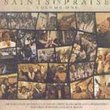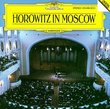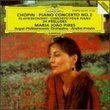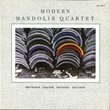| All Artists: Fausto Cleva, Pietro Cimara, Erich Leinsdorf, Paul Breisach, Leonard Rose, Milne Charnley Title: Bidu Sayao: Opera Arias and Brazilian Folksongs Members Wishing: 0 Total Copies: 2 Label: Sony Release Date: 10/1/1996 Album Type: Original recording remastered Genres: Special Interest, Pop, Classical Styles: Vocal Pop, Opera & Classical Vocal, Historical Periods, Modern, 20th, & 21st Century Number of Discs: 1 SwapaCD Credits: 1 UPC: 074646235522 |
Search - Fausto Cleva, Pietro Cimara, Erich Leinsdorf :: Bidu Sayao: Opera Arias and Brazilian Folksongs
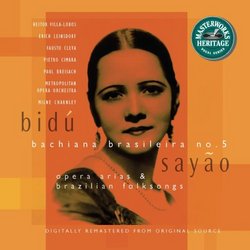 | Fausto Cleva, Pietro Cimara, Erich Leinsdorf Bidu Sayao: Opera Arias and Brazilian Folksongs Genres: Special Interest, Pop, Classical
Bidú Sayão's silvery, impeccably tuned voice was small in size, but rich in nuance, shading, and emotion. Her recording of the Villa-Lobos Bachiana Brasileira No. 5 is justly famous, unmatched for lightness and... more » ![header=[] body=[This CD is available to be requested as disc only.]](/images/attributes/disc.png?v=15401716) ![header=[] body=[This CD is available to be requested with the disc and back insert.]](/images/attributes/disc_back.png?v=15401716) ![header=[] body=[This CD is available to be requested with the disc and front insert.]](/images/attributes/disc_front.png?v=15401716) ![header=[] body=[This CD is available to be requested with the disc, front and back inserts.]](/images/attributes/disc_front_back.png?v=15401716) |
Larger Image |
CD DetailsSynopsis
Amazon.com Bidú Sayão's silvery, impeccably tuned voice was small in size, but rich in nuance, shading, and emotion. Her recording of the Villa-Lobos Bachiana Brasileira No. 5 is justly famous, unmatched for lightness and sensuality. Few have dashed off the Jewel Song from Faust with similar insouciance or imbued the last phrases of Manon's "Adieu , notre petite table" as touchingly as Sayão does here. Her French song interpretations glow with charm and style, and a previously unreleased snippet from Ravel's L'enfant et les sotilèges makes one regret she never recorded the entire role, Sony's transfers are more lifelike and three dimensional than previous issues. A delectable disc. --Jed Distler Similar CDs
Similarly Requested CDs
|
CD ReviewsAn unjustly forgotten diva's breadth and style Jay Dickson | Portland, OR | 01/08/2002 (5 out of 5 stars) "Bidu Sayao is probably best-known today for the famous recording of the Hector Villa-Lobos piece that opens this disc--which is a tragedy, since this piece (though exquisite) shows only one side of her vocal artistry. Although her performance on the Villa-Lobos is quite keening and melancholy, Bidu Sayao was best-known during the height of her career for her command of the French repertoire, which usually called for great charm and flirtatiousness . Indeed, on most of the beautiful arias from french operas she sings here she's asked to celebrate her beauty and her adorableness--and this was made all the easier because Sayao *was* beautiful and adorable. Moreover, she had exquisite phrasing and control, and was a superb interpreter of the coloratura repertoire. There may never have been a better Manon than Sayao, and she performs no less than four of the great arias massenet wrote for this role. In each one you can recognize the same character, and yet they display gorgeously the different moods Sayao could so subtly convey: from the silly giddiness of the arrival aria to the misplaced regret of "Voyons, Manon," to the touching pathos of "Adieu, notre petite table" and finally to the brilliant confidence of the famous Gavotte.Sayao had a relatively small voice, but it was often said of her that despite this one could easily hear her from the very back of the old Met, even during a chorus, so careful and unique was her phrasing and style. You can really hear this on this terrific cd." Perfection! Impostazione | New York City Area | 12/16/2003 (5 out of 5 stars) "There is a tremendous sincerity and perfection present in this CD. The Villa Lobos has attained classic status and should be owned by serious collectors. I have not heard No. 5 surpassed yet. Rosa Ponselle wrote in her biography that Sayao's pianissimi were "unequalled in my experience", the finest she had ever heard. Mind you, Ponselle heard them all including that Spanish Diva that made a career of singing softly. However, in Sayao's voice they have meaning are used to emotional effect superbly. Otherwise, the voice is so finely tuned that this old mono recording often gives a studio effect.Bravo Madame Sayao!" One of the great vocal discs of the century Impostazione | 05/07/1999 (5 out of 5 stars) "Sayao was simply one ot the great singers of the century who was not given the opportunity to record her vast repetoire-- she was a great interpreter of the French song literature--was there a better singer of Debussy? She sang Lucia, Lakme, Zerbinetta --Bellini, Mozart, Verdi and Puccini so what we have is a small but precious souvenir."
|

 Track Listings (23) - Disc #1
Track Listings (23) - Disc #1